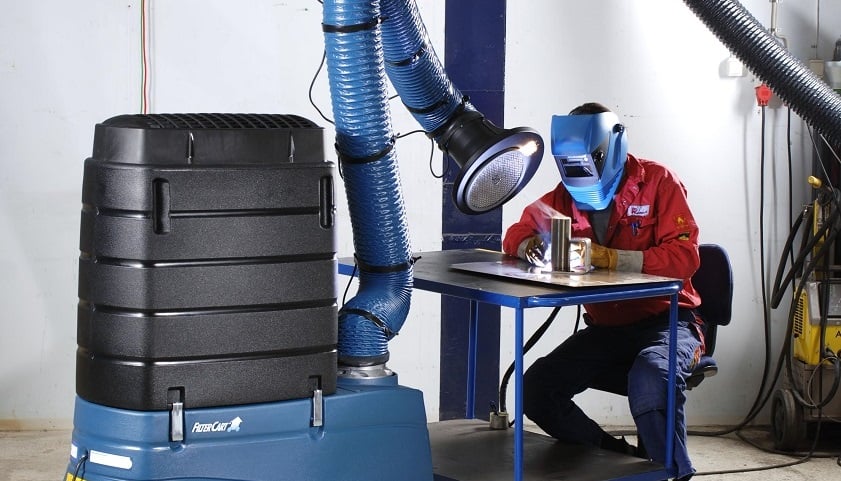Health and safety inspections are now resuming again after postponement during the Pandemic
Whether your servicing and LEV certification wasn’t renewed last year, or you didn’t get round to upgrading your welding fume extraction equipment. Here are our five top tips for ensuring you are compliant when the health and safety inspector comes knocking…
- Always use good ventilation and RPE (respiratory protective equipment), including work outdoors.
For light and/or sporadic welding with MIG,MAG,FCA,MMA and gas welding processes, a combination of good ventilation and RPE is the “best practise” approach to take. Even when outside RPE should be used by the welder to avoid direct inhalation of fumes. Click here for examples of Respiratory Protective Equipment. - Use an LEV system such as a mobile filter where practicable.
A common sense approach should be taken here, put yourself in the shoes of the inspector – if you could/should be using an LEV system (where conditions/location allow), are you? It is always better to be safe than sorry! You will also need to ensure the unit has the correct type of filter for your work.
Special filters are required for grinding jobs for example and HEPA filters can also be required for some applications. - For regular and/or high intensity welding with MIG/MAG/FCA/MMA and gas, LEV is always required.
Supplementary RPE should also be considered for personnel in the working area.
Any situation that could be deemed as “high risk” – i.e production workshop environments and frequent welding, an LEV system will be required. This could be in the shape of mobile filters for welding bays, or a fixed system with ducting to the main filter depending on usage and applications. It is also advisable that personnel working in the vicinity of the welding area should wear RPE. - Ensure filters on LEV systems are checked regularly and replaced where necessary.
It may seem obvious, but routine things like keeping filters working efficiently can easily be one of those jobs that is forgotten. Ensure operators are aware of how to check the filters and keep a small supply in stock to avoid waiting for replacements. Also keep a copy of the manual close by or make everyone aware where they are kept if required. - It is compulsory to keep up with annual servicing and COSHH testing of fume extraction equipment, for validation of LEV certification requirements.
Ensure you set out a yearly plan with your maintenance team and make sure this is followed through. If your LEV certificates are not valid, you will have failed the inspection and in some circumstances your inspector may shut down production until the issue is rectified.
Make life easy for yourself and keep to a regular schedule!

We have a large range of fume extraction solutions for a variety of applications.
Click here to view our current stock if you know what you’re looking for, alternatively contact us to arrange a site visit to discuss your requirements with one of our experienced engineers.
COSHH testing of fume extraction equipment and LEV certification can also be arranged. This is a standard service that we offer to our customers, but we can also provide annual service and LEV certification visits if you did not buy your fume extraction equipment from us.
Get in touch and we will be happy to help!
Take a look at our video below showing the effect of using a welding fume extraction filtration unit!
If you would like a more in depth look at HSE requirements for fume extraction, the full .gov factsheet on fume extraction for welding (as of today’s date) is available here to help you plan for your HSE inspection.


comments
Correct advice. I would also like to add that if you want to reduce risks and ensure inspection with operational safety and compliance with standards, you should use Software that will optimize all work processes
That was an informative blog! It is really helpful for those working in the harsh working environments.